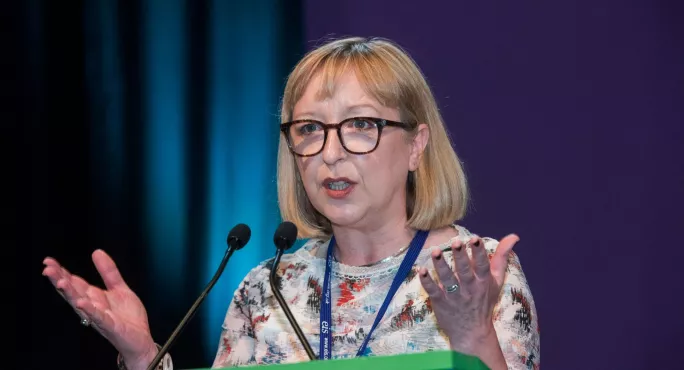Scottish teacher pay campaign: ‘no bystanders, no wallflowers’

In August, Andrea Bradley will become the first woman in the role of EIS general secretary since the union was formed 175 years ago.
But at the weekend she was already making clear the sort of tone she wants to set on critical issues such as teacher pay, workload, class sizes and additional support needs (ASN).
Her address to the first full in-person EIS annual general meeting since before Covid, in 2019, was strikingly combative, and niceties about education secretary Shirley-Anne Somerville were dispensed with right from the start.
- Somerville: No guarantees on use of extra non-contact time
- Outgoing EIS general secretary: Focus on nursery teachers to close attainment gap, says Flanagan
- Teacher workload: Four-day week campaign gets green light from teachers at EIS AGM
“I’m going to talk about just a few of the areas where I think we need to go full pelt,” she said at the outset, starting with the campaign for a 10 per cent pay rise.
“We’ll be ballot ready, strike ready, by October,” she added, counselling that “this has to be another one of those ’no pasarán’ moments in our trade union history” - and that all EIS members have to get involved.
“We want all of our members to get involved in the Pay Attention campaign - no bystanders, no wallflowers.
“Some gentle persuasion here, some cajoling there, some outright requests to take on a role over there too; no bystanders. This pay claim is for everyone.
“We need to make sure that all our members are included in the pay campaign activities and all other activity, too.”
Perhaps mindful that two motions calling for reform to the process of selecting EIS general secretaries were on the AGM agenda - both were heavily defeated, including one calling for elections in which all EIS members vote - Bradley seemed eager to show from the start the strength she will bring to the role. In setting out her stall, she will also have been well aware that some members were not happy about the EIS’ role in the recent pay settlement for 2021-22.
Speaking on Saturday, Bradley described the address by education secretary Shirley-Anne Somerville the day before as “pathetically weak” on teacher workload, and in particular the policy of reducing teachers’ weekly class-contact time by 90 minutes.
Bradley said there had been “some lip-service acknowledgment of the effort of teachers during the pandemic” but “a failure to give assurances that the promised extra 1.5 hours contact time would be protected for teachers’ own use”.
Somerville had arrived “with nothing, no crisis response to teacher workload - in spite of the fact that teachers have been on the frontline of the crisis response to Covid for the past two and a half years”.
Bradley revealed that she and the current EIS general secretary, Larry Flanagan, had hinted to Somerville that she should come to the EIS AGM with some good news, “something to salve the pain”; instead, said Bradley, the education secretary “came with nothing but lukewarm words that poured salt on the wounds”.
Bradley described Somerville’s non-committal response on what the extra 90 minutes of non-contact time should be used for as “ominous” and said it should spur EIS members on in their “20:20” campaign for maximum class sizes of 20 by 2030.
She covered myriad issues from “off the scale” teacher workload to the “national disgrace” of underresourced ASN and the need for reform of the Scottish Qualifications Authority, not a rebrand but a “complete demolition”.
On each one, she wanted the message to be that Scotland’s biggest teaching union will be an inexorable force under her leadership, summed up pithily by the last three words of her speech: “we never stop”.
The evidence from Bradley’s speech, and the EIS AGM more generally, certainly suggests that, far from being cowed by the trauma and turmoil of the Covid era, teachers in Scotland will be bringing fresh energy to the causes that matter to them.
Henry Hepburn is Scotland editor at Tes. He tweets @Henry_Hepburn
Register with Tes and you can read two free articles every month plus you'll have access to our range of award-winning newsletters.
Keep reading with our special offer!
You’ve reached your limit of free articles this month.
- Unlimited access to all Tes magazine content
- Save your favourite articles and gift them to your colleagues
- Exclusive subscriber-only stories
- Over 200,000 archived articles
- Unlimited access to all Tes magazine content
- Save your favourite articles and gift them to your colleagues
- Exclusive subscriber-only stories
- Over 200,000 archived articles
topics in this article



